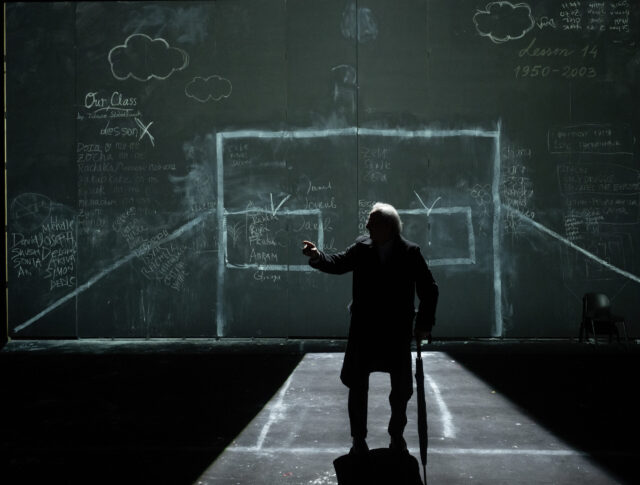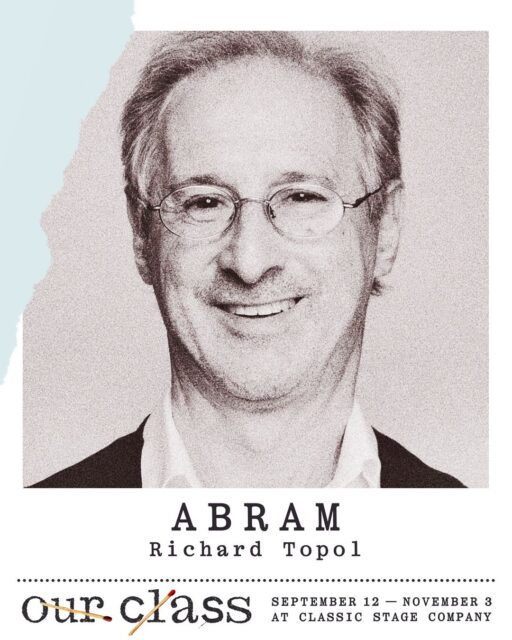
Rich Topol first played Abram Baker in Our Class at BAM this past January (photo by Pavel Antonov)
OUR CLASS / THE MERCHANT OF VENICE
Classic Stage Company, Lynn F. Angelson Theater
136 East Thirteenth St. between Third & Fourth Aves.
Our Class: Tuesday – Sunday, September 12 – November 3, $89-$139
The Merchant of Venice: Tuesday – Sunday, November 22 – December 22, $59-$129
www.classicstage.org
www.arlekinplayers.com
Earlier this year, Arlekin Players Theatre and MART Foundation’s timely new adaptation of Polish playwright Tadeusz Słobodzianek’s 2008 drama, Our Class, sold out a three-week run at the BAM Fisher as part of the Under the Radar festival. Inspired by actual events that occurred in the small village of Jedwabne, Poland, the three-hour play, directed by the endlessly inventive Igor Golyak, focuses on antisemitism among a group of ten Polish students, five Jewish, five Catholic, all born in 1919–20, from childhood to young adulthood to old age, although several don’t make it through a horrific 1941 pogrom.
In my January 30 review, I wrote, “The cast and crew, who hail from Russia, Ukraine, Poland, Israel, Germany, and the US, are superb. . . . Perhaps the best thing about Our Class is that it doesn’t preach at the audience; it has a message and a point of view but is not teaching us about good and evil.”
The show, which was nominated for Drama League, Outer Critics Circle, and Drama Desk Awards, is back for a return engagement September 12 – November 3 at Classic Stage, with the same cast and crew. One thing that will be at least somewhat different is the staging, as Classic Stage is smaller and more intimate than the Fisher (199 seats vs. 250), and the audience sits on three sides of the action. Arlekin’s residency continues there November 22 – December 22 with the New York debut of its unique and unusual production of Shakespeare’s The most excellent historie of the Merchant of Venice with the exxtreame cruelitie of Shylocke the Jewe, featuring much of the same team as Our Class, including director Golyak and actors Richard Topol, Gus Birney, José Espinosa, Tess Goldwyn, Stephen Ochsner, and Alexandra Silber.
Topol, who has starred as Jewish characters on and off Broadway in such works as Indecent, The Chosen, Awake & Sing, Prayer for the French Republic, and King of the Jews, plays Abram Baker in Our Class, a student who leaves Poland and becomes a rabbi in America. In The Merchant of Venice, he will play Shylock, the Jewish moneylender previously portrayed by Edmund Kean, Edwin Booth, Jacob Adler, Orson Welles, Al Pacino, Laurence Olivier, John Douglas Thompson, Andrew Scott, and many others.
In my January 8 Substack post “‘class consciousness’: we are not safe. again.,” exploring Our Class and antisemitism in relation to Hamas’s brutal attack on Israel on October 7 and the aftermath, Topol explained, “Certainly the violence that is occurring in both Ukraine and Israel/Gaza is impacting my relationship and understanding of the play. And it’s making Our Class a story that feels even more important to tell. Because it’s based on true events that occurred not far from Ukraine. And because it’s about cycles of hate. And the violence that can come from that hate.”
As the company began rehearsals for the Classic Stage transfer, I asked Topol several questions about the two plays and his characters.

twi-ny: What similarities do you see between Abram and Shylock?
rt: Well, for starters, they are both Jews living through perilous times filled with antisemitism. They are both fathers who love their children deeply. They are both connected to their religion fully. And they both face moments where they struggle with how to respond to people who treat them with indignity.
twi-ny: What are their main differences?
rt: I think their main difference is how they respond to being treated with indignity. Shylock seeks revenge. He can’t see straight once he’s been broken. Abram is treated less harshly but he also is a kinder man who tries to come to terms with the world as it is in a way that allows for forgiveness or redemption or understanding. And I think that is because Abram is a rabbi who feels the blessings of his G-d around him, even as he suffers harm. Shylock is a businessman, a moneylender, and though he is connected to his Jewish faith, he isn’t as grounded in its teachings as Abram is. Abram creates this gigantic family, these generations of descendants whom he loves and cherishes. Shylock feels like he’s alone in the world, with only his one daughter as his ally. And once she’s gone he has nobody he can lean on, live for, or help him see straight.
Also, because of Abram’s inherent kindness, he sees the best in people, the hope for the world, the possibilities for the future. Maybe Shylock had some kindness in him somewhere but we certainly don’t see much if any of it during the course of the play. Maybe it was snuffed out when his wife died. But bottom line there is a hardness in Shylock’s soul as opposed to a kind of softness in Abram’s.
twi-ny: How might Abram have fared as the Venetian moneylender in Merchant, and how might Shylock have done as the rabbi in Our Class?
rt: That’s a great question and a fun thing to try to imagine. Abram seems like a pretty smart guy, so maybe he would have figured out how to make a successful go of it as a Venetian moneylender. He’s good with languages, he’s a hard worker, and he has a kind of can-do attitude that would have stood him in good stead. I like his chances.
Shylock as a rabbi . . . hmm . . . I’m thinking no way. At least not the kind of rabbi I’d like to hear at synagogue! He definitely feels strongly about his tribe, his people, his religion. But I don’t see him as having the right temperament to be a leader to his fellow Jews.
twi-ny: What would they think about the state of the world if they were alive today, with the same jobs?
rt: Shylock as a modern-day moneylender — a banker in this world of global capitalism — he might be just fine. I think most of the Jews of this time live with greater freedoms, respect, and opportunity than during Shylock’s time in Venice. He’d certainly recognize the antisemitism of our time, but if he were a banker in Venice now I think he might be thriving and might feel like a true equal to his Christian counterparts.
Abram, well, he was alive not that long ago. But I think he’d be heartbroken to see the rise of antisemitism in this country. My sense of him is of someone who loved and seized on the promise and opportunity of America, symbolized by the Statue of Liberty. An immigrant who was always thankful for the chance to make a new and full life here. And he would be as disturbed by the hate and divisiveness of our time right now as many of us are.
[Mark Rifkin is a Brooklyn-born, Manhattan-based writer and editor; you can follow him on Substack here.]